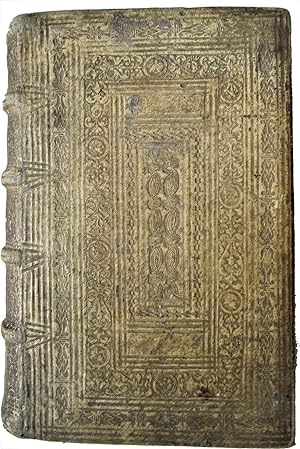Descripción
8vo (173 x 110 mm). [24], 761, [15] pp. Roman and italic types, shoulder notes, woodcut printer's device on title (Silvestre 1002), woodcut head- and tail-pieces and initials. Contemporary blind roll-tooled alum-tawed skin, edges stained green (some minor rubbing). Provenance: Jesuits of Amberg (Bavaria), 18th-century inscription on title, later paper shelfmark label at foot of spine;? a few 18th-century marginal notes and occasional underlinings in red ink in the last treatise.?? First Latin edition of four works of erudite spirituality by a personal friend of Calvin, an Augustinian monk from Anjou who abandoned the cowl to become a Huguenot, becoming the most prominent advocate of French Calvinism in the period preceding the Edict of Nantes. L'Espine's writings belong to a group of major literary sources for the modern understanding of the "interior life" of French Calvinists, supplanting the paucity of historical sources such as records of sermons or synodal and consistory documents (Roussel, pp. 139 & 151). His pastoral works of spiritual edification and consolation, combining the traditional tropes and forms of Catholic pastoral literature with Calvinist convictions, met with great success and were widely translated, reaching readers in England, the Low Countries, and Germany. The present translations by Th?odore Gautier, edited by Simon Goulart, appear to be the first published Latin translations of any of l'Espine's works. First published under the title Excellens discours touchant le repos et contentement de l'esprit ([Geneva], 1587), De tranquillitate animi is l'Espine's longest work. Tacitly directed at the Huguenot faithful, traumatized by decades of civil war, the work consists of a series of written sermons counseling control of one's emotions, organized by vice to be vanquished: ambition, anger, envy, sensuality, jealousy, curiosity, and fear. Each point is supported by similes and exempla drawn from Classical and Christian historians and moralists, and punctuated by citations from the Psalms (though "de l'Espine carefully avoids the Lives of the Saints or citations of recent Catholic theologians" [op. cit., p. 155]). The French text was reprinted a dozen times before 1600, in various Protestant cities from La Rochelle to Basel. Simon Goulart, humanist theologian, edited the collection; his dedicatory epistle to the Huguenot captain Fran?ois de la Noue appeared in the original 1587 edition. The present edition contains an additional preface by the translator, dedicated to Jean Colotius & Th?odore Colladon. Following the main work, which ends on p. 492, and is fully indexed, are three shorter, unindexed treatises by the same author: De Iustitia Christiana, translated from the Excellent trait? de la justice chrestienne?([S.l.], 1577); De Confessione peccatorum,?first published as the Trait? excellent et vrayement chrestien de la reconoissance et confession des pechez ? Dieu ([Geneva], 1587), describing in openly Calvinist terms "numerous pragmatic prescriptions amounting to a method of personal confession to God" (Roussel, p. 143);?and Pro aegrotis consolandis (caption title Consolatio et Instructio ad aegrotos), a translation of de l'Espine's Traict? pour consoler les malades (La Rochelle, 1588), which advises the dying how to combat "fear: of sins, death, devils, the malediction of the law, and divine anger and retribution."? Stoer reprinted Gautier's Latin version in 1594, or re-issued the same sheets, according to GLN 15-16 (online database of books printed before 1600 in Geneva, Lausanne & Neuch_atel). Further editions, expanded with an additional treatise, appeared in 1600. OCLC lists no copies of this edition in the US, but GLN 15-16 records two copies, at the University of N. Carolina and Chicago State Univ. Adams L-550: Moeckli 131; Haag VII, 37 ff.; L. Hogu, Jean de l'Espine moraliste et theologien (1913), 38; Bernard Roussel, "Jean de l'Espine (ca. 1505-97): ?crire dans un temps de troubles," in Pettegre. N° de ref. del artículo 2110
Contactar al vendedor
Denunciar este artículo
![]()


